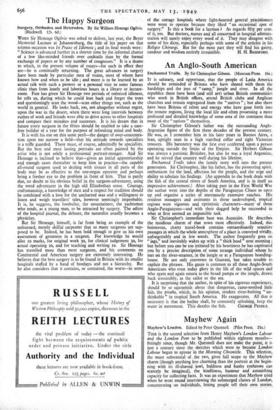The Happy Surgeon
Surgery, Orthodox and Heterodox. By Sir William Heneage Ogilvie. (Blackwell. 12s. 6d.)
WHEN Sir Heneage Ogilvie was asked to deliver, last year, the Beyer Memorial Lecture at Johannesburg, the title of his paper on that solemn occasion was In Praise of Idleness ; and its final words were : "Science is advanced further in a shorter time by the informal chatter of a few like-minded friends over cocktails than by the formal exchange of papers or by any number of congresses." It is a theme to which, in the present volume of essays—for such in effect they are—he is continually returning. The great advances in surgery have been made by particular men of vision, most of whom have known how and when to be idle ; and more is to be learned by an actual talk with such a pioneer or a personal visit to some famous clinic than from lonely and laborious hours in a library or lecture- room. Fate has given Sir Heneage two periods of enforced idleness, he tells us, during which he could lean back and forget the trees and questioningly scan the wood—scan other things too, such as the world in general. He looks back, too, not altogether without regret, upon the war in the desert, when there were long intervals between rushes of work and friends were able to drive across to other hospitals and compare their mistakes and successes. It is his dream that in future every surgeon in the fifties should be enabled to take a care- free holiday of a year for the purpose of refreshing mind and body.
It is with his eye on this same peril—the danger of over-concentra- tion upon too narrow a field—that his attitude towards specialists is a trifle guarded. There must, of course, admittedly be specialists. But the best and most lasting portraits are often painted by the artist who is not solely a professional portrait-monger. And Sir Heneage is inclined to believe that—given an initial apprenticeship and enough cases thereafter to keep him in practice—the capable all-round surgeon used to dealing with tissues in all parts of the body may be as effective as the one-organ operator and perhaps bring a fresher eye to the problem in front of him. That is partly due, no doubt to his obvious belief in the surgeon-adventurer, using the word adventurer in the high old Elizabethan sense. &usage, craftsmanship, a knowledge of men and a respect for tradition should be combined with a love for the uncharted seas and a willingness to listen and weigh travellers' tales, however seemingly improbable. It is, he suggests, the footballer, the mountaineer, the yachtsman who tends, as a young man, to be attracted by surgery. The editor of the hospital journal, the debater, the naturalist usually becomes a physician.
But Sir Heneage, himself, is far from being an example of the unlearned, merely skilful carpenter that so many surgeons are sup- posed to be Indeed, he has been bold enough to give us his own assessment of greatness in a surgeon. For knowledge he would allot to marks, for original work 30, for clinical judgement 30, for actual operating 20, and for teaching and writing so. Sir Heneage has travelled more than most surgeons, and his comments on Continental and American surgery are extremely interesting. He believes that the best surgery is to be found in Britain with its smaller hospitals staffed by a band of brothers and not a hierarchy. But he also considers that it contains, or contained, the worst—in some
of the cottage hospitals where light-hearted general practitioners were wont to operate because they liked "an occasional spot of surgery." Is this a book for a layman ? As regards fifty per cent. of it, yes. But doctors, nurses and all concerned in hospital adminis- tration will surely enjoy every word of it. They may disagree with some of his dicta, especially perhaps with some of the articles in his Religio Chirurgi. But for the most part they will find his gaiety,
candour and wisdom entirely irresistible. H. H. BASHFORD.






































 Previous page
Previous page